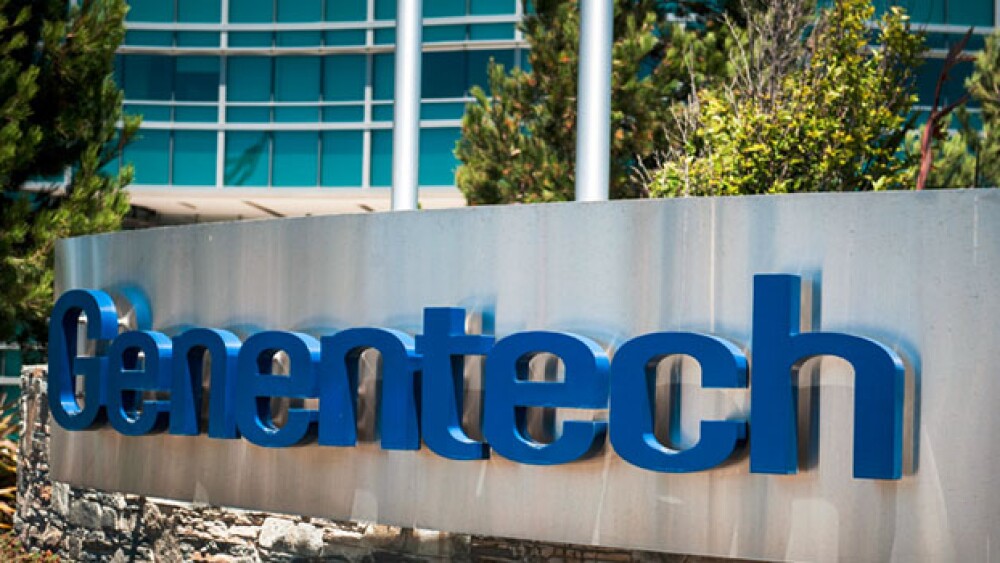Genentech, released follow-up data from its Phase III ALEX trial comparing its Alecensa (alectinib) to Pfizer’s Xalkori (crizotinib) in late-stage non-small cell lung cancer (NSCLC).
Genentech, a Roche company, released follow-up data from its Phase III ALEX trial comparing its Alecensa (alectinib) to Pfizer‘s Xalkori (crizotinib) in late-stage non-small cell lung cancer (NSCLC).
The results showed that Alecensa significantly cut the risk of disease progression or death by 57 percent compared to Xalkori after two years of follow-up in individuals with anaplastic lymphoma kinase (ALK)-positive metastatic (advanced) NSCLC. The median progression-free survival (PFS) for patients on Alecensa more than tripled compared to those on Xalkori. The PFS for the Alecensa group was 34.8 months compared to 10.9 months for the Xalkori group.
“Follow-up results from the ALEX study demonstrate the significant sustained benefit of Alecensa, showing that people with metastatic ALK-positive non-small cell lung cancer lived for almost three years without their disease progressing,” said Sandra Horning, Roche/Genentech’s chief medical officer and head of Global Product Development, in a statement. “These results further support the use of Alecensa as a standard of care for people who are newly diagnosed with this form of lung cancer.”
Alecensa is currently approved by the U.S. Food and Drug Administration (FDA) to treat ALK-positive metastatic NSCLC as detected by an FDA-approved clinical diagnostic test.
The ALEX trial is a randomized, multicenter, open-label Phase III trial comparing Alecensa to Xalkori in treatment-naïve patients with ALK-positive NSCLC which was diagnosed by the Ventana ALK (D5F3) CDx Assay, a companion immunohistochemistry test developed by Roche Tissue Diagnostics. Patients were randomized one-to-one to receive either of the drugs. The primary endpoint was PFS as assessed by the investigator. Secondary endpoints included Independent Review Committee (IRC)-assessed PFS, time to CNS progression, objective response rate (ORR), duration of response (DOR) and overall survival (OS).
The Roche trial involved 303 patients at 161 sites in 31 countries. The data will be presented at the 2018 American Society of Clinical Oncology (ASCO) Annual Meeting on Sunday, June 3 at 8:00 to 11:30 a.m. CDT.
Genentech also released positive results from its Phase III IMpower 150 trial of Tecentriq (atezolizumab) and Avastin (bevacizumab) plus carboplatin and paclitaxel (chemotherapy) for first-line treatment of patients who had not received chemotherapy with metastatic NSCLC. Interim data analysis indicated that the combination helped people live significantly longer compared to Avastin plus carboplatin and chemo.
“The IMpower 150 study results showed a significant survival benefit, adding to the clinical evidence supporting the combination of Tecentriq and Avastin as an initial treatment for metastatic non-squamous non-small cell lung cancer,” Horning said in a statement. “An overall survival benefit was also observed in key populations such as people with EGFR- and ALK-positive mutations and those with liver metastases. We are working with health authorities around the world to bring this potential Tecentriq combination regimen to people living with this disease.”
The combination of Tecentriq and Avastin plus carboplatin and paclitaxel was recently given Priority Review from the U.S. Food and Drug Administration (FDA) for first-line treatment of chemotherapy-naïve patients with metastatic NSCLC. The agency is expected to make a decision by September 5, 2018.
This data will be presented at ASCO on Monday, June 4 at 3:45 to 3:57 p.m. CDT.





